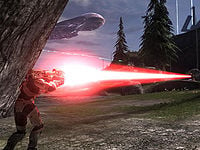Laser: Difference between revisions
From Halopedia, the Halo wiki
No edit summary |
BaconShelf (talk | contribs) mNo edit summary |
||
| (17 intermediate revisions by 11 users not shown) | |||
| Line 1: | Line 1: | ||
{{ | {{Status|Canon}} | ||
{{ | {{Wikipedia}} | ||
{{Cleanup}} | {{Cleanup}} | ||
[[File:The Covenant SL.jpg|200px|thumb| [[John-117]] using a UNSC shoulder-mounted laser weapon against a Covenant [[Shade|Plasma Turret]].]] | [[File:The Covenant SL.jpg|200px|thumb| [[John-117]] using a UNSC shoulder-mounted laser weapon against a Covenant [[Shade|Plasma Turret]].]] | ||
| Line 7: | Line 7: | ||
Humanity first developed laser technology in May 1960, when the first solid-state ruby laser was built and tested by Theodore Maiman at Hughes Research Laboratories. By the 21st century, lasers had become a multi-billion dollar industry. Civilian applications included reading digital storage disks, reading bar codes, or in handheld devices such as laser pointers. Lasers used in medicine are used for internal surgery and cosmetic applications. In manufacturing, they were used for precision cutting, welding, and other functions. They were also commonly used in various fields in science, especially spectroscopy. Lasers were also used by the military for target identification and weapons guidance systems. All of these uses are presumably just as widespread five centuries later. | Humanity first developed laser technology in May 1960, when the first solid-state ruby laser was built and tested by Theodore Maiman at Hughes Research Laboratories. By the 21st century, lasers had become a multi-billion dollar industry. Civilian applications included reading digital storage disks, reading bar codes, or in handheld devices such as laser pointers. Lasers used in medicine are used for internal surgery and cosmetic applications. In manufacturing, they were used for precision cutting, welding, and other functions. They were also commonly used in various fields in science, especially spectroscopy. Lasers were also used by the military for target identification and weapons guidance systems. All of these uses are presumably just as widespread five centuries later. | ||
The use of laser technology for offensive purposes was still in its infancy during the 21st century, mostly specializing in | The use of laser technology for offensive purposes was still in its infancy during the 21st century, mostly specializing in ordnance threat neutralization, but in recent times the UNSC has developed several laser-based weapons. The Covenant, on the other hand, has been using laser-based weaponry for far longer. [[Xenotime]] is critical to the manufacture of ultra-efficient lasers.{{Ref/Novel|Id=HO1|Oblv|Chapter=1}} | ||
==Applications== | ==Applications== | ||
*The Covenant uses [[pulse laser turret]]s and other directed energy weapons as the standard armament of all of its warships, from the small [[missionary ship]]s to the titanic [[Covenant assault carrier|assault carrier]]s, supplementing more devastating [[ | *The Covenant uses [[pulse laser turret]]s and other directed energy weapons as the standard armament of all of its warships, from the small [[missionary ship]]s to the titanic [[Covenant assault carrier|assault carrier]]s, supplementing more devastating [[plasma turret]]s. These weapons consist of chemical [[Wikipedia:Hydrogen fluoride laser|hydrogen fluoride lasers]].<ref>'''[[Halo: Contact Harvest]]'''</ref> In addition, some Covenant warships such as the {{Pattern|Zanar|light cruiser}} are equipped with beam lasers, using them for precision strikes during suppression campaigns.<ref name="Warfleet72">'''[[Halo: Warfleet]]''', ''Attack Ships'', ''pages 72-73''</ref> | ||
*The UNSC has been slower to adapt lasers to combat uses, though laser turrets are equipped to [[Office of Naval Intelligence]] [[UNSC Prowler| | *The UNSC has been slower to adapt lasers to combat uses, though laser turrets are equipped to [[Office of Naval Intelligence]] [[UNSC Prowler|prowlers]]<ref>'''[[Halo: Ghosts of Onyx]]'''</ref> and the UNSC is issuing the [[M6 Spartan Laser]] into frontline service.<ref>'''[[Halo 3]]'''</ref> Though not a weapon, the [[laser designator]], the [[H-165 Forward Observer Module|H-165]] and [[H-295 Forward Observer Module|H-295]] target locators uses a laser beam to designate targets and measure the distance between itself and an object. The [[laser aiming module]] is a [[weapon attachment]] used to increase targeting accuracy. | ||
*Some varieties of [[Human-Covenant War]]-era developments in UNSC space-borne [[nuclear weapon]]s use [[Wikipedia:Nuclear pumped laser|nuclear-pumped]] X-ray lasers to increase the warheads' effectiveness against Covenant warships' [[energy shielding]].<ref>''[[Halo: Warfleet]]'', p. 16</ref> | |||
*Some [[Kig-Yar]] firearms use lasers for projectiles.<ref>'''[[Halo: Mortal Dictata]]''', ''page 329''</ref> | |||
*Lasers also have [[civilian]] applications, such as in mining and excavation machinery. The mining drill on the [[JOTUN Heavy Industries]] [[EM-240 Neides auger]] uses a state-of-the-art solid-state laser to achieve remarkable drilling efficiencies.<ref>[https://www.halowaypoint.com/en-us/news/canon-fodder-looking-glassed '''Halo Waypoint''': ''Canon Fodder - Looking Glassed'']</ref> | |||
==Gallery== | |||
<gallery> | |||
File:CCS weapons.png|A ''CCS''-class Battlecruiser's pulse laser turrets firing. | |||
File:H4-SpartanLaser.png|The M6 Spartan Laser. | |||
File:UNSC Laser Designator.png|A UNSC Laser Designator. | |||
File:HReach - Target Locator.png|The H-165 FOM Target Locator. | |||
File:H4-H295FOMTargetLocator.png|The H-295 FOM Target Locator. | |||
</gallery> | |||
==Sources== | ==Sources== | ||
{{Ref/Sources}} | |||
[[Category:Technology]] | [[Category:Technology]] | ||
[[Category:Directed-energy weapons]] | [[Category:Directed-energy weapons]] | ||
Latest revision as of 12:38, June 16, 2022
| There is more information available on this subject at Laser on the English Wikipedia. |
| This article does not meet the wiki's general standards and/or standards on layouts. You can help by cleaning this article. |
A laser is a device that emits a narrow, monochromatic beam of light with a well-defined wavelength. The word laser is derived from the acronym for Light Amplification by Stimulated Emission of Radiation; it uses electrical, optical, or chemical means to excite atoms in an active medium (light-emitting material), producing a powerful light pulse, and a specialized mirror system to collimate, focus, and amplify the beam.
Humanity first developed laser technology in May 1960, when the first solid-state ruby laser was built and tested by Theodore Maiman at Hughes Research Laboratories. By the 21st century, lasers had become a multi-billion dollar industry. Civilian applications included reading digital storage disks, reading bar codes, or in handheld devices such as laser pointers. Lasers used in medicine are used for internal surgery and cosmetic applications. In manufacturing, they were used for precision cutting, welding, and other functions. They were also commonly used in various fields in science, especially spectroscopy. Lasers were also used by the military for target identification and weapons guidance systems. All of these uses are presumably just as widespread five centuries later.
The use of laser technology for offensive purposes was still in its infancy during the 21st century, mostly specializing in ordnance threat neutralization, but in recent times the UNSC has developed several laser-based weapons. The Covenant, on the other hand, has been using laser-based weaponry for far longer. Xenotime is critical to the manufacture of ultra-efficient lasers.[1]
Applications[edit]
- The Covenant uses pulse laser turrets and other directed energy weapons as the standard armament of all of its warships, from the small missionary ships to the titanic assault carriers, supplementing more devastating plasma turrets. These weapons consist of chemical hydrogen fluoride lasers.[2] In addition, some Covenant warships such as the Zanar-pattern light cruiser are equipped with beam lasers, using them for precision strikes during suppression campaigns.[3]
- The UNSC has been slower to adapt lasers to combat uses, though laser turrets are equipped to Office of Naval Intelligence prowlers[4] and the UNSC is issuing the M6 Spartan Laser into frontline service.[5] Though not a weapon, the laser designator, the H-165 and H-295 target locators uses a laser beam to designate targets and measure the distance between itself and an object. The laser aiming module is a weapon attachment used to increase targeting accuracy.
- Some varieties of Human-Covenant War-era developments in UNSC space-borne nuclear weapons use nuclear-pumped X-ray lasers to increase the warheads' effectiveness against Covenant warships' energy shielding.[6]
- Some Kig-Yar firearms use lasers for projectiles.[7]
- Lasers also have civilian applications, such as in mining and excavation machinery. The mining drill on the JOTUN Heavy Industries EM-240 Neides auger uses a state-of-the-art solid-state laser to achieve remarkable drilling efficiencies.[8]
Gallery[edit]
- UNSC Laser Designator.png
A UNSC Laser Designator.
Sources[edit]
- ^ Halo: Oblivion, chapter 1
- ^ Halo: Contact Harvest
- ^ Halo: Warfleet, Attack Ships, pages 72-73
- ^ Halo: Ghosts of Onyx
- ^ Halo 3
- ^ Halo: Warfleet, p. 16
- ^ Halo: Mortal Dictata, page 329
- ^ Halo Waypoint: Canon Fodder - Looking Glassed




